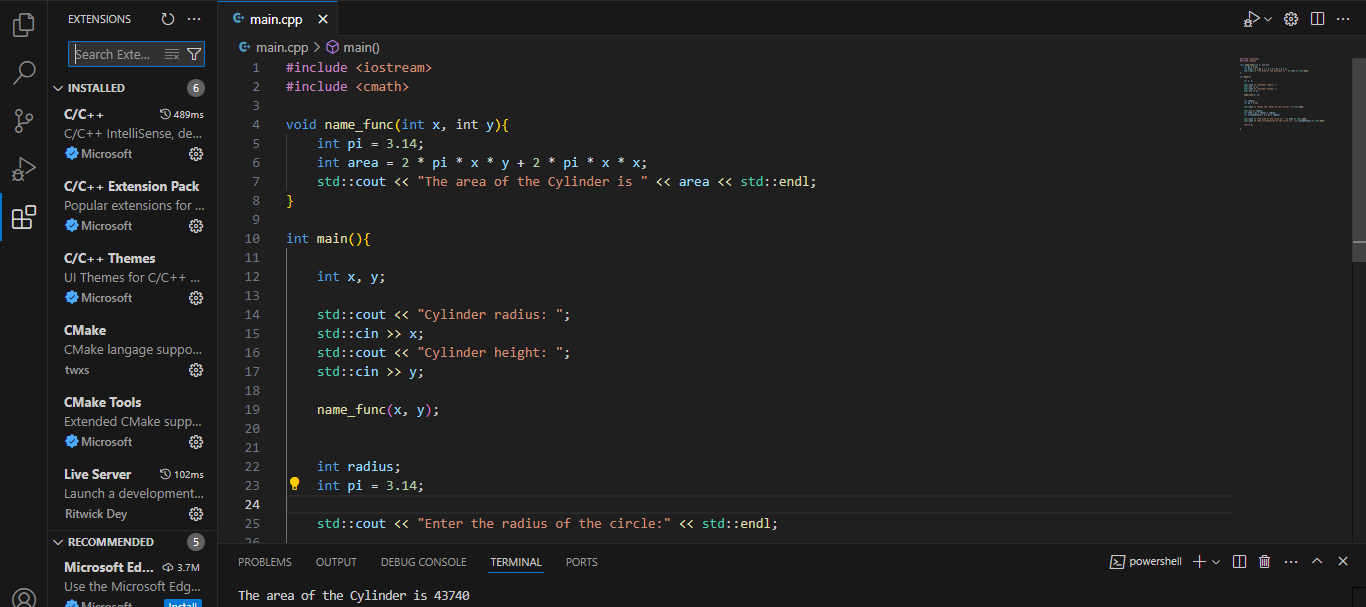C++
C++ was developed by Bjarne Stroustrup and released in 1985, is a versatile, compiled and powerful programming language known for its ability to handle complex tasks with high performance. It supports both object-oriented and generic programming, allowing developers to create efficient and reusable code. C++ provides direct control over memory management and system resources, making it ideal for big applications such as game development, systems programming, and high-performance computing. Besides, its compatiblity with C allows you to use existing C code within your C++ program and leverage the vast libraries and tools available for C.
What makes it important to learn is because C++ is the foundation for other programming, many programming language out there such as Java and C# is influenced by C++. The next thing is that C++ highly demanded due to its best performance and efficiency among other programming language. It also allows direct control over the hardware.
Javascript
JavaScript is interpreted, high-level programming language that mostly used to make interactive and dynamic web page. Developers used JavaScript alongside HTML and CSS for web development. It can also be used for backend development and various applications using Node JS.
It's a great way to get started if you're just start to learn programming, especially for web development, because of its versatility, beginner-friendly, and highly demanding.
Python
Python is an interpreted, high level programming, and dynamically typed. Python became the most popular programming language due to its versatility, simplicity, and readability. Python mostly applied in data analysis, science data, machine learning, software engineering, web development, and more.
Python is dynamically typed and has a simple syntax. It's great way to learn, even if you don't know any programming. Python also has large communities that can help you to find numerous resources and tutorials.
Java
Java is high level, object oriented programming, and class based programming language that commonly used for mobile / desktop application, enterprise applications, and more. It was developed by Sun Microsystems in 1995 and now owned by Oracle Corporation. It is designed to run efficiently and platform-independently, allowing programs to run on any platforms that has Java Virtual Machine (JVM).
Java offers numerous job opportunities and serves a foundation for other programming. Its features and scalability make it ideal for large-scale applications. Besides, its widespread use and versatility make it a valuable skill to learn.
C#
C# is a high-level and versatile programming language developed by Microsoft that combines the power of object-oriented programming with the flexibility and productivity of modern programming languages. C# is commonly used for developing a wide range of application such as web app development, mobile / desktop applications, cloud services, and games. C# Leveraging its rich features set and integration with the .NET ecosystem. Make it really well for robust and high performance application.
C# is a fantastics language to learn. It boasts a clean and intuitive syntax, making it accessible for beginners while still powerful enough for advanced developers. Its strong community support and extensive libraries simplify the development process, allowing for rapid prototyping and robust application building. Learning C# can open up numerous career opportunities in a dynamic and evolving technology landscape.
C
C is a procedural, general-purpose, and compiled programming language. Was developed in 1972 by Dennis Ritchie. C is Known for its efficiency, flexibility, and performance. It provides low-level access to memory and language constructs directly through pointers, making it suitable for tasks when direct manipulation of memory is needed. C also has influenced many other languages and remains popular for system programming, embedded systems, and applications that require high performance.
Albeit C is being old, it's still worth learning, especially for system programming. Learning C helps you understand how low-level operations work and makes learning other programming language easier. Besides, C offers high efficiency and performance.
SQL (Structured Query Language)
SQL is a non-procedural programming language used for managing and manipulating relational databases. Non-procedural language means users can specify what they want (queries) rather than how to do it (as in procedural languages). SQL enables users to store, manipulate, and retrieve data from databases. SQL is used to create and modify database schemas (Data Definition Language), insert, update, and delete records (Data Manipulation Language), and query the database for specific information (SELECT statements). Its syntax is standardized, but variations exist between database management systems (DBMS), such as MySQL, PostgreSQL, Oracle Database, Microsoft SQL Server, and others. Its versatility and ease of use make it a fundamental tool for developers, data analysts, and database administrators to manage and leverage data with efficiency.
Swift
Swift is a modern programming language developed by Apple that prioritizes safety, performance, and easy to code. It features strong type safety and type inference, which help catch errors early and simplify code. Swift introduces optionals for handling missing values safely and uses Automatic Reference Counting (ARC) for efficient memory management. Its syntax is clean and expressive, supporting functional programming with closures, pattern matching for complex data handling, and robust error handling mechanisms. Swift encourages protocol-oriented programming and offers powerful generics, extensions, and advanced string handling. With built-in concurrency support through async/await and an open-source nature, Swift is designed to create high-performance, reliable applications across Apple's platforms and other environments.
Go
Go, often referred to as Golang, is a statically typed high-level programming language developed by Google. Go was designed with a focus on simplicity, efficiency, and concurrency. It features a clean and straightforward syntax that facilitates rapid development and readability. One of its standout features is the built-in support for concurrency through goroutines and channels, which simplifies the creation of concurrent programs compared to traditional threading models. Go compiles to machine code quickly and includes a robust standard library that covers essential functionalities such as networking, cryptography, and web servers. It is cross-platform, running efficiently on various operating systems, and benefits from being open-source, fostering a vibrant community and continuous improvement. Go is particularly favored for building scalable, networked, and distributed systems, making it a popular choice for cloud services and backend development.
Rust
Rust is a systems programming language that prioritizes safety, concurrency, and performance. It is designed to be as fast as C and C++ with additional safety guarantees. It enforce memory safety without a garbage collector by using a unique ownership system that enforces strict rules at compile time, preventing common bugs like null pointer dereferences and data races. Rust is widely used for systems programming, web development, and increasingly for applications in areas like game development and embedded systems. Its growing popularity is due to its strong safety guarantees and performance characteristics, making it a valuable tool for a variety of applications.

 Pinterest
Pinterest Youtube
Youtube